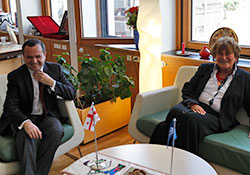WHO/Europe “a bridge that unites the Region”

WHO
During an official visit to Georgia on 17–18 June 2010, Ms Zsuzsanna Jakab, WHO Regional Director for Europe, recognized the advances the country has achieved in health care, and praised the Government for its innovative policies in directing scarce public funds to address social inequalities, despite significant challenges.
Understanding the need to tackle social inequalities to improve health, and engaging different sectors beyond health is a key element of Ms Jakab’s vision on taking office as Regional Director in February this year. At a meeting with key partners, national counterparts and the Georgian Medical Society, Ms Jakab explained her priorities for WHO, and how the Organization seeks to bring together countries, sectors and organizations to promote health.
“I see the WHO Regional Office for Europe as an organization that unites and integrates the Region: acting as a bridge between different parts and promoting solidarity, equity and health,” she stated.
The Regional Director met with Prime Minister Nikoloz Gilauri, First Lady Sandra Roelofs, the Chair of the Parliament Committee and Vice-Speakers of Parliament, as well as Mr Alexander Kvitashvili, Minister of Labour, Health and Social Affairs, during her productive two-day visit.
Considering the main health challenges facing Georgia, Ms Jakab singled out noncommunicable diseases – such as heart disease, stroke, cancer, and diabetes, the leading causes of mortality in the country. She explained that, in addition to supporting the Government in preventing and managing chronic conditions, WHO was advising on the development of a national strategic plan on HIV/AIDS for 2011–2016, and on fighting tuberculosis and malaria. Ms Jakab also identified strengthening Georgia’s capacity to tackle pandemic diseases and respond to emergencies as important joint tasks.
WHO collaboration with Georgia in 2010–2011 focuses on four key areas:
- strengthening the health system by enhancing the health system stewardship function of the Ministry of Labour, Health and Social Affairs;
- improving maternal and child health to achieve the Millennium Development Goals;
- addressing communicable diseases, particularly tuberculosis, HIV/AIDS and malaria, which includes implementing the International Health Regulations); and
- addressing noncommunicable diseases (including mental health) and environmental health issues.



